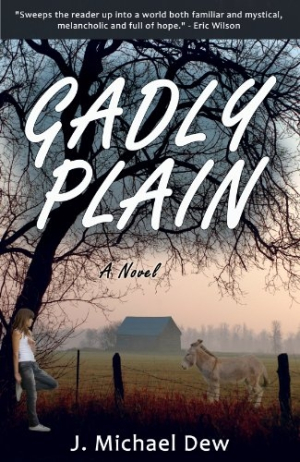Gadly Plain
Expertly rendered reshapings of biblical stories provide a thoughtful commentary on storytelling’s reflection on the human condition.
Gadly Plain is a meditative coming-of-age novel that wades through the grief of a young girl yet, in subtle flashes of revelation, offers a biting commentary on life, death, and the foibles of the human condition.
Bereft at the loss of her father and sudden abandonment by her mother, twelve-year-old Spring-baby befriends the offbeat, seemingly simple-minded farm help, Chirp Vanhoosen, and a donkey named Amen. Through Chirp, Spring-baby learns that Amen has existed since the beginning of time. In fact, he witnessed the fall of Adam and Eve and since then has stoically observed messengers—from Noah to Moses to Jesus—cleave their paths through human history. Amen’s stories mark a difficult journey of healing for Spring-baby as she tries to reconcile the disconsolate grief of the adults around her with her own inability to understand the nature of life and death.
J. Michael Dew’s prose style is at once light, reflecting the naiveté of the young protagonist, yet sonorous, navigating the line between the fanciful and deeply contemplative. Dew captures the grief-fogged perspective of Spring-baby as she quietly observes the adults around her fall apart. Her observations are matter-of-fact—“Everybody knew Granny was a smoker … Everybody ignored her politely”—but revelatory, encapsulating the petty details that make a person real, fallible, and heartbreakingly human. This dry, almost detached surveillance is put alongside lines that are poetic and dreamy, striking at the heart of a character and explicating the nature of grief in beautifully ruminative ways (“Mike was a smoking wick seconds after a puff took the flame”). Though Dew sometimes has the tendency to overwrite and use metaphors that dilute meaning instead of clarify (“There was still no phone call, and even the expectation of one had grown as faint as a star discovered at dawn”), his ability to create depth and variety through diction and character study serves the novel well.
Though the heart of this story lies in Spring-baby’s journey through incredible grief, its success lies in its commentary on the power of storytelling and the ways in which it reflects humans striving for grace in a complex world. Dew subverts traditional biblical stories through what seems like an absurd retelling from the perspective of a donkey. This retelling, however, is expertly rendered.
Gadly Plain is a book about sorrow, regret, and grief—but it is also about the fleeting spirit of childhood and the choices we make to believe in the stories that give us hope. Gentle and reflective, this is a story about stories and the incredible power they hold to heal and redeem broken hearts.
Reviewed by
Shoilee Khan
Disclosure: This article is not an endorsement, but a review. The publisher of this book provided free copies of the book to have their book reviewed by a professional reviewer. No fee was paid by the publisher for this review. Foreword Reviews only recommends books that we love. Foreword Magazine, Inc. is disclosing this in accordance with the Federal Trade Commission’s 16 CFR, Part 255.

